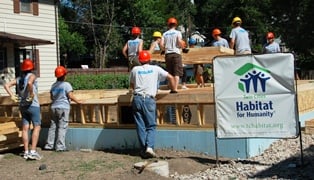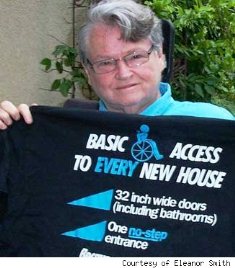Ecolab begins work on affordable housing project in St. Paul
Construction has just begun on this two-story, single family home with three bedrooms and one and a half bathrooms. Longtime Habitat supporter...
3 min read
Laura Grevas : 12:00 PM on March 13, 2012
Affordable housing lobbyists are giddy.
One Minnesota Senator has remarked, “Housing issues are HOT this year. I’m hearing a lot about it.” Another Senator shared that our issue was “in the best position in years!” And, Habitat’s own lobbyist, Trista Matascastillo, has had meetings canceled with legislators because “they get it” and “they are already hearing tons from constituents.”
Great job everyone! Our advocacy is working.
The power was evidenced at a Monday night hearing before the Senate Capital Investment Committee hearing. State agencies were presenting the “Governor’s bills,” and Minnesota Housing asked that we join them in our united pitch for bonding for affordable housing. While the Governor has requested $32 million, they agree that it can’t hurt that advocates are pushing for more.
Affordable housing advocates have unified behind a $40 million request -- $30 million for rehab of supportive, private, and foreclosed properties and $10 for rehab of public housing.I wanted to share a bit about Monday’s hearing, because I think it was a great mix of expert testimony and tangible imagery from constituents to illustrate how important quality, affordable housing is to its residents and the communities it is in.
The testimony began with Minnesota Housing Commissioner Mary Tingerthal speaking to the statewide need and the agencies ability to get bonding resources out quickly to it’s private and public partners. She estimated that the Governor’s request would result in rehabbing over 1,000 units of affordable housing.
Next up, Chris Flood with First Homes in Rochester noted that their land trust model was able to develop workforce housing in communities that direly needed places for workers to live. He noted that Mayo Clinic was frustrated that people weren’t accepting jobs in Rochester because of lack of affordable housing. In using prior appropriations form Minnesota Housing, First Homes was able to help fix this problem.
Kelly Matter with Common Bond Communities did a superb job weaving the expertise of a developer and the imagery of veterans’ service to talk about how bonding resources could be used to help with current vets supportive projects at Fort Snelling in St. Cloud. In her testimony, she noted:
We will develop 93 units, 58 of the units will include historic preservation of existing buildings on the Fort Snelling Upper Post and 35 units will be new construction on the VA campus in St. Cloud. These communities will serve individual veterans and veterans and their families … Most important this housing will provide dignified, respectful and safe housing with services for the men and women who have served our country and have returned home unable to find stable employment and housing.
Next up, came DeeAnna Bakken of the Jackson Housing and Redevelopment Authority. She drove several hours to present at the hearing. And it was worth it. Her Senator, Julie Rosen, was in attendance and smiling throughout DeeAnna’s testimony.
DeeAnna did a great job of sharing stats -- like there is a backlog of over $300 million of needed improvements in public housing -- and painting a picture of the need:
Our public housing facilities have been well maintained but 57% of our buildings are over 35 years old and are aging. Our operating margins are not adequate to cover the cost of major rehabilitation needs such as roofs, boilers, elevators or window replacement throughout a building.
She noted that:
The general obligation bonds will help repair or replace low quality windows, replace inefficient heating systems, repair roofs, bring elevators into compliance and help to make public housing properties last for the low income tenants of Minnesota.
What was most striking is that during all of this testimony, the Senators were glued to what was being said … nodding their heads, taking notes, getting ready to ask questions.
The hearing was capped off with Senator Carla Nelson beaming with pride as she thanked Chris Flood for his testimony and the great work First Homes had done at transforming neighborhoods in Rochester. She talked about the foreclosed properties bought up, improved, and then resold to buyers who could get into homeownership because of the affordable land trust model.
I love it when legislators make your case for you. Sen. Nelson did.

So I titled this blog post, “Powerful week for affordable housing committee begins with Senate hearing.” That’s because Monday night’s hearing was only the beginning.
Those comments from legislators I reference at the beginning … that was intelligence we gleaned from constituents sharing the results of their communications with legislators.
Thursday, a ton of communication with legislators took place as the Minnesota Coalition for the Homeless hosted its lobby day. If you were able to attend, please share with us the stories you shared and what your legislators commit to.
If you couldn't be there, call or e-mail your legislators and tell them to listen to what hundreds of citizen lobbyists will be saying about how quality, affordable housing can continue making Minnesota a great place to live.
Michael Dahl is the Grassroots Coordinator for the HousingJobs Campaign and blogs regularly about social justice issues on Speak for We.
Your gift unlocks bright futures! Donate now to create, preserve, and promote affordable homeownership in the Twin Cities.

Construction has just begun on this two-story, single family home with three bedrooms and one and a half bathrooms. Longtime Habitat supporter...
Baby boomers (those born between 1946 and 1964) are reaching the age of senior status, which means there is an increasing elderly population. By...

This week in the news we see several stories highlighting the different challenges individuals face in obtaining safe and stable housing. And we see...